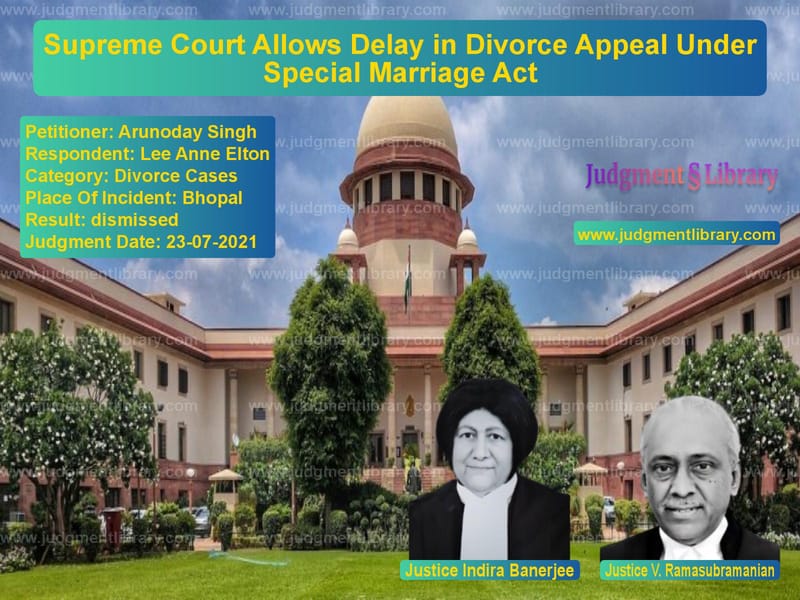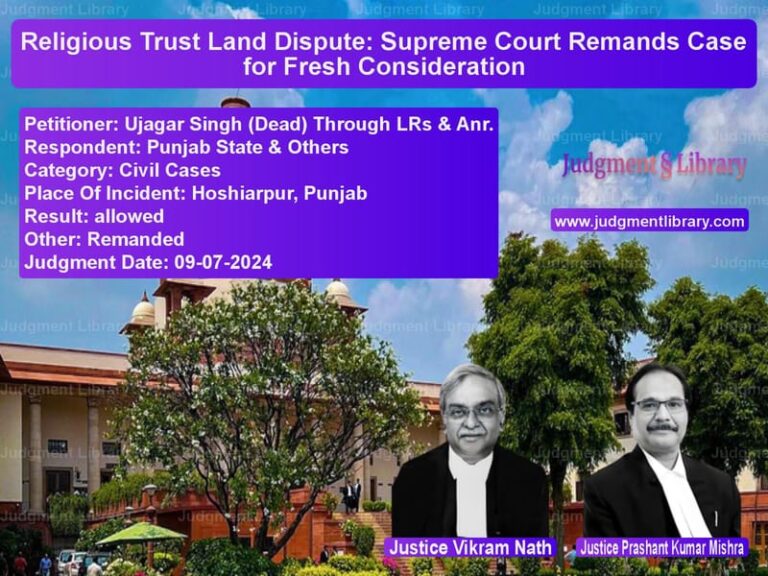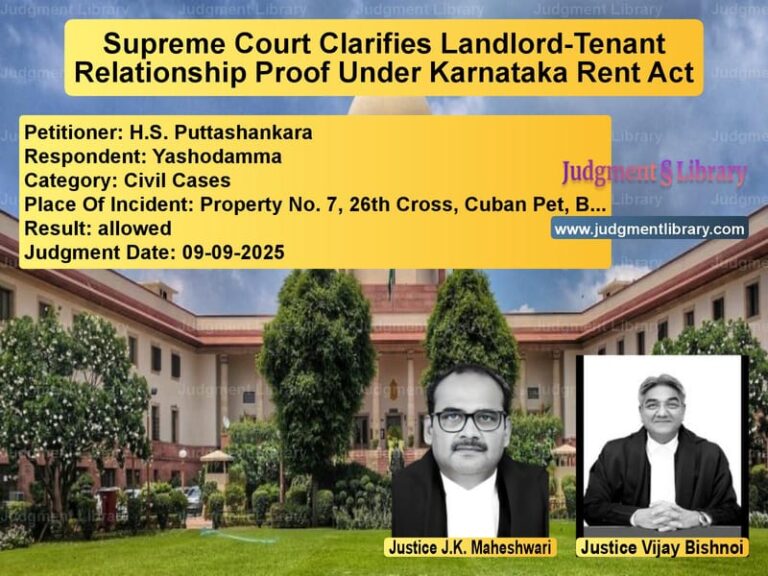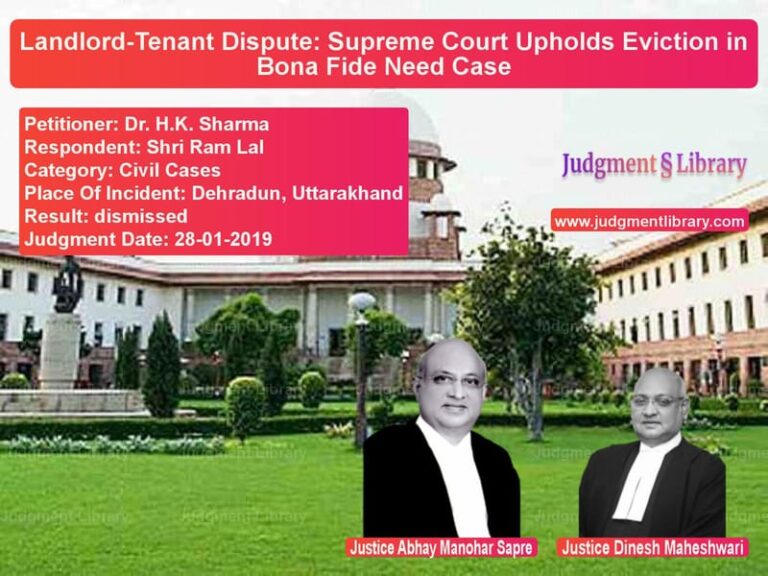Supreme Court Allows Delay in Divorce Appeal Under Special Marriage Act
The case of Arunoday Singh v. Lee Anne Elton revolved around the issue of whether the delay in filing an appeal against a divorce decree under the Special Marriage Act, 1954, could be condoned under Section 5 of the Limitation Act, 1963. The Supreme Court upheld the High Court’s decision to condone the delay, reinforcing the principle that courts should adopt a liberal approach when deciding cases on their merits rather than dismissing them on technical grounds.
Background of the Case
The petitioner, Arunoday Singh, had obtained an ex parte divorce decree from the Family Court on December 18, 2019, under the Special Marriage Act, 1954. The respondent, Lee Anne Elton, filed an appeal against the decree before the Jabalpur Bench of the Madhya Pradesh High Court under Section 19 of the Family Courts Act, 1984, read with Section 39 of the Special Marriage Act. However, the appeal was filed with a delay, leading to the respondent seeking condonation of the delay.
Read also: https://judgmentlibrary.com/supreme-court-resolves-matrimonial-dispute-through-settlement-agreement/
The High Court allowed the application for condonation of delay, which was challenged before the Supreme Court by the petitioner on the ground that the delay was not condonable.
Petitioner’s Arguments
- The appeal under Section 19(3) of the Family Courts Act had to be filed within 30 days from the date of the judgment.
- The Special Marriage Act prescribes a 90-day period for filing an appeal, but Section 20 of the Family Courts Act overrides this, making the 30-day limitation applicable.
- Section 29(3) of the Limitation Act excludes the applicability of its provisions to suits or proceedings under marriage and divorce laws unless expressly stated otherwise.
- The Special Marriage Act does not provide for the application of the Limitation Act, meaning the delay could not be condoned under Section 5 of the Limitation Act.
Respondent’s Arguments
- The respondent had filed the appeal within the 90-day period as per the Special Marriage Act, believing it to be the applicable limitation period.
- The legal confusion over the applicable limitation period was a valid ground for condonation of delay.
- The Family Courts Act is not a substantive law governing marriage and divorce but only provides for the establishment of family courts and related procedures.
- Section 29(2) of the Limitation Act allows the application of its provisions unless expressly excluded, which was not the case here.
Supreme Court’s Ruling
The Supreme Court upheld the High Court’s decision to condone the delay, making the following key observations:
“The Appeal was under Section 19 of the Family Courts Act, which is not substantive law relating to marriage and divorce but an Act for constitution of Family Courts to deal with disputes relating to marriage and family affairs. The proceedings in the Family Court relating to marriage and divorce are not proceedings under the Family Courts Act even though the procedure prescribed under the Family Courts Act may be followed. Section 29(3) of the Limitation Act is, therefore, not attracted to appeals under the Family Courts Act.”
The Court further stated that neither the Family Courts Act nor the Special Marriage Act expressly excluded the application of Sections 4 to 24 of the Limitation Act, thereby allowing for condonation of delay under Section 5.
The Court reiterated that the exclusion of the Limitation Act under Section 29(3) applies only to original proceedings, such as filing for divorce or judicial separation, and not to appeals. It cited precedent from the Calcutta High Court in Sipra Dey v. Ajit Kumar Dey, which held that matrimonial appeals are not barred from the benefit of the Limitation Act.
Key Takeaways from the Judgment
- Appeals under the Special Marriage Act are not excluded from the purview of the Limitation Act.
- The Family Courts Act does not override the Limitation Act’s applicability to appeals in matrimonial cases.
- When procedural confusion exists regarding the limitation period, a liberal approach should be taken to condone delays.
- Court decisions should focus on deciding cases on merits rather than technical grounds.
Conclusion
This ruling clarifies that appeals in matrimonial disputes should not be rejected merely on technical grounds. By condoning the delay, the Supreme Court reinforced the principle that cases involving marriage and divorce should be adjudicated on their merits, ensuring that parties have the opportunity for a fair hearing.
Petitioner Name: Arunoday Singh.Respondent Name: Lee Anne Elton.Judgment By: Justice Indira Banerjee, Justice V. Ramasubramanian.Place Of Incident: Bhopal.Judgment Date: 23-07-2021.
Don’t miss out on the full details! Download the complete judgment in PDF format below and gain valuable insights instantly!
Download Judgment: arunoday-singh-vs-lee-anne-elton-supreme-court-of-india-judgment-dated-23-07-2021.pdf
Directly Download Judgment: Directly download this Judgment
See all petitions in Mutual Consent Divorce
See all petitions in Alimony and Maintenance
See all petitions in Property Division in Divorce Cases
See all petitions in Judgment by Indira Banerjee
See all petitions in Judgment by V. Ramasubramanian
See all petitions in dismissed
See all petitions in supreme court of India judgments July 2021
See all petitions in 2021 judgments
See all posts in Divorce Cases Category
See all allowed petitions in Divorce Cases Category
See all Dismissed petitions in Divorce Cases Category
See all partially allowed petitions in Divorce Cases Category







